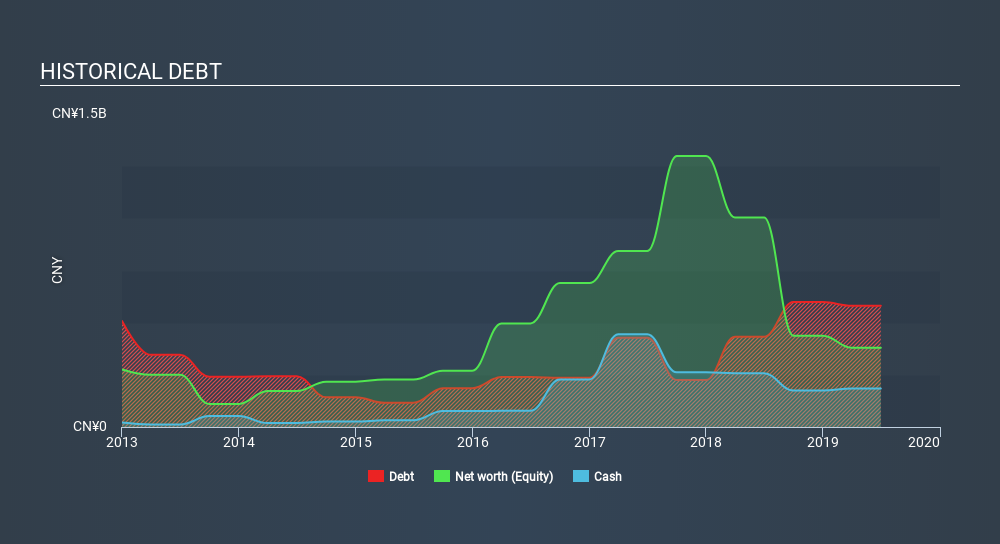Asia Television Holdings (HKG:707) Is Making Moderate Use Of Debt

Some say volatility, rather than debt, is the best way to think about risk as an investor, but Warren Buffett famously said that 'Volatility is far from synonymous with risk. It's only natural to consider a company's balance sheet when you examine how risky it is, since debt is often involved when a business collapses. We note that Asia Television Holdings Limited (HKG:707) does have debt on its balance sheet. But is this debt a concern to shareholders?
What Risk Does Debt Bring?
Debt is a tool to help businesses grow, but if a business is incapable of paying off its lenders, then it exists at their mercy. If things get really bad, the lenders can take control of the business. While that is not too common, we often do see indebted companies permanently diluting shareholders because lenders force them to raise capital at a distressed price. Of course, debt can be an important tool in businesses, particularly capital heavy businesses. When we examine debt levels, we first consider both cash and debt levels, together.
View 6 warning signs we detected for Asia Television Holdings
What Is Asia Television Holdings's Debt?
The image below, which you can click on for greater detail, shows that at June 2019 Asia Television Holdings had debt of CN¥581.1m, up from CN¥433.3m in one year. However, because it has a cash reserve of CN¥184.3m, its net debt is less, at about CN¥396.8m.

How Strong Is Asia Television Holdings's Balance Sheet?
The latest balance sheet data shows that Asia Television Holdings had liabilities of CN¥834.2m due within a year, and liabilities of CN¥76.3m falling due after that. Offsetting these obligations, it had cash of CN¥184.3m as well as receivables valued at CN¥220.5m due within 12 months. So its liabilities outweigh the sum of its cash and (near-term) receivables by CN¥505.6m.
This deficit is considerable relative to its market capitalization of CN¥631.6m, so it does suggest shareholders should keep an eye on Asia Television Holdings's use of debt. Should its lenders demand that it shore up the balance sheet, shareholders would likely face severe dilution. The balance sheet is clearly the area to focus on when you are analysing debt. But it is Asia Television Holdings's earnings that will influence how the balance sheet holds up in the future. So if you're keen to discover more about its earnings, it might be worth checking out this graph of its long term earnings trend.
Over 12 months, Asia Television Holdings reported revenue of CN¥167m, which is a gain of 10%, although it did not report any earnings before interest and tax. That rate of growth is a bit slow for our taste, but it takes all types to make a world.
Caveat Emptor
Over the last twelve months Asia Television Holdings produced an earnings before interest and tax (EBIT) loss. Its EBIT loss was a whopping CN¥199m. When we look at that and recall the liabilities on its balance sheet, relative to cash, it seems unwise to us for the company to have any debt. Quite frankly we think the balance sheet is far from match-fit, although it could be improved with time. Another cause for caution is that is bled CN¥212m in negative free cash flow over the last twelve months. So suffice it to say we consider the stock very risky. The balance sheet is clearly the area to focus on when you are analysing debt. But ultimately, every company can contain risks that exist outside of the balance sheet. For example, we've discovered 6 warning signs for Asia Television Holdings (of which 2 are major) which any shareholder or potential investor should be aware of.
If, after all that, you're more interested in a fast growing company with a rock-solid balance sheet, then check out our list of net cash growth stocks without delay.
If you spot an error that warrants correction, please contact the editor at editorial-team@simplywallst.com. This article by Simply Wall St is general in nature. It does not constitute a recommendation to buy or sell any stock, and does not take account of your objectives, or your financial situation. Simply Wall St has no position in the stocks mentioned.
We aim to bring you long-term focused research analysis driven by fundamental data. Note that our analysis may not factor in the latest price-sensitive company announcements or qualitative material. Thank you for reading.
About SEHK:707
Asia Television Holdings
An investment holding company, involved in the processing, printing, and selling of finished fabrics in the People’s Republic of China, Malaysia, and Hong Kong.
Slight with weak fundamentals.
Market Insights
Community Narratives





